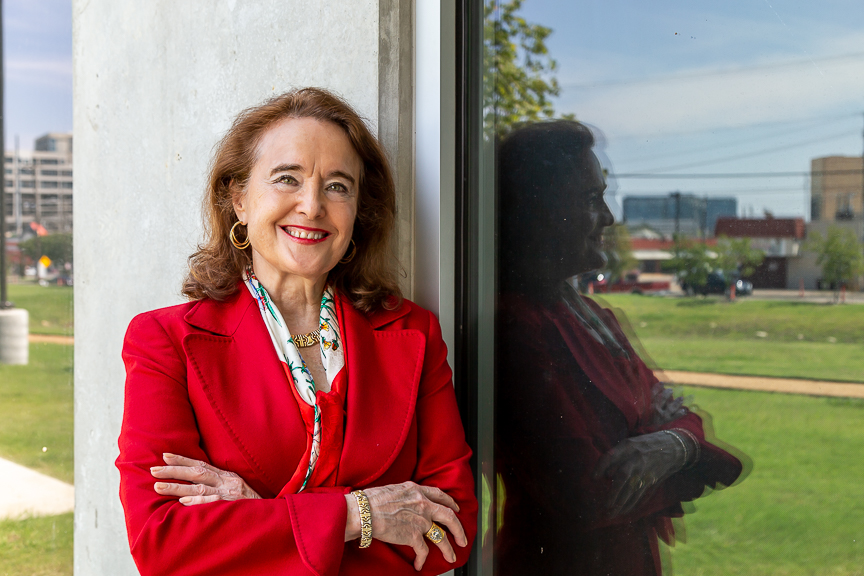
Claire Stanard starts her work day at 8 every morning, and she often finishes after midnight. Her days are filled with conversations with developers of all kinds, from hotels to daycare facilities to liquor stores across the entire city, and chats with community members. This job is not paid.
That is the life of a Dallas City Plan Commission member.
The 15 members are appointed by City Council and the Mayor to oversee and make recommendations for land use and development in Dallas, enforcing zoning rules or deciding when it’s OK to break them. Stanard represents District 13, which includes Preston Hollow, on the commission.
“Even though we are unpaid, the upside is that we can be independent of political influences and make our determinations based solely on the merits of each project,” Stanard says. “I am not running for office or looking for a job, so I am able to make objective considerations.”
This is just the latest of many careers the 72-year-old has collected. She started out as a professional singer in her teen years, traveling across the United States and abroad. She participated in Eurovision and sang in pubs in Europe.
She left her folk singing career to work as a press secretary for U.S. Sen. Vance Hartke, a Democrat from Indiana who served from 1959-77. She continued working in politics and became the director of the Women’s Division of the National Democratic Party.
In her 30s, Stanard obtained her master’s and worked as a marriage and family therapist for over 20 years, but her career collection wasn’t over yet. She obtained a master’s in Education and taught English at Faith Family Academy and Christ the King schools.
Those experiences prepared Stanard for her current position, she says.
Presenting to the commission comes naturally after a singing career. Politics taught her some things about law and negotiation. And she’s always educating people on the nuances of development and zoning, especially when they have grievances.
“One of the things that constituents need to do is get in on the ground floor,” Stanard says. “Don’ t wait until the meeting happens in front of the City Planning Commission. Have a community meeting and organize your opposition.”
Because the commission handles zoning and development, affordable housing is a topic Stanard knows well.
“There is confusion between ‘affordable housing,’ which is low-income housings, ‘attainable housing’ which is workforce housing, and ‘mixed-income housing’ which is having slightly below market rate renters combined with other multifamily lessees,” Stanard says. “ The bottom line in Dallas right now is that working-class people are being uprooted by the lack of attainable housing and rising rental rates.”
Dallas’ biggest problem is that we have ver y few working-class rentals, she says. Though affordable or low-income housing is a huge need, even attainable housing for the workforce is lacking.
When making zoning decisions, Stanard has to take into account median income, transportation, proximity to a park and other factors. However, she’s found in many instances that rent prices exceed affordable or attainable.
“Dallas, Texas, is the ninth-largest city in the United States, and it promised to have workforce housing within the city limits,” Stanard says. “But they are being pushed out, and I don’t know where these displaced families are going to go.”
Though Stanard doesn’t have an answer to this crisis, says she believes more people need to be aware that this is a citywide issue which needs to be addressed with a comprehensive plan to slow gentrification and address rampant displacement through community engagement.
“The shame of it is that we need young people on the city planning commission, but young people are working,” Stanard says. “ This is not part-time; this is a whole job.”
Some days, Stanard is reminded that the long hours and lack of paychecks are worth it, like when the owner of apartments in Vickery Meadow’s refugee relocation area donated apartments for children to get tutoring after school while their parents worked, calling it Heart House.
For 20 years, licensed teachers volunteered to help refugee children at Heart House acclimate to life and schooling in the U.S. That is, until the February 2021 winter storm, when firefighters went into the building to inspect for damage. They shut the child care center down because that use wasn’t allowed in the apartment complex’s zoning.
Heart House received a Specific Use Permit to qualify as a child care center, and Stanard spoke to the commission to share their story. The horseshoe at City Hall was left in tears as they granted the permit, allowing the Heart House homework club to continue to serve refugee children in the area.
“That is what makes this job worthwhile,” she says.





